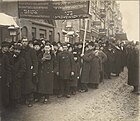Tates, mames, kinderlekh
| Part of a series on |
| Bundism |
|---|
 |
| 1890s to World War I |
|
| Interwar years and World War II |
| After 1945 |
|
| People |
| Press |
| Songs |
| Associated organisations |
| Splinter groups |
|
| Categories |
Tates, mames, kinderlekh (
Yiddish song from the 1920s associated with the socialist General Jewish Labour Bund movement.[1][2] The song describes a workers' strike in Łódź; as men, women and children joined in to construct barricades in the streets of the city.[1][3] Tates, mames, kinderlekh was written by Shmerke Kaczerginski, who later became a Communist Party activist and a partisan fighter.[1][2] Kaczerginski was only 15 years old at the time the song was written in 1926. The song rapidly became widely popular in the Jewish community in Poland.[2]
Recordings
- "In Love And In Struggle: The Musical Legacy Of The Jewish Labor Bund", featuring The Workmen's Circle Chorus, 1999 [translates the lyrics into English] Recording
- "The Klezmatics - On Holy Ground", The Klezmatics, 2010 Recording
- "A Tribute to Vilna", Jewish Labour Bund Melbourne, 2013 Recording
- "In Der Heym/Down Home", Michael Alpert & Craig Judelman, 2023 [translates the lyrics into English] Recording
Lyrics
| Yiddish[2] | Transliteration[2] | Translation[2] |
|---|---|---|
| טאַטעס מאַמעס קינדערלעך בױען באַריקאַדן | Tates, mames, kinderlekh, boyen barikadn, | Fathers, mothers, children, raising barricades, |
| אױף די גאַסן גײען אַרום אַרבעטער־אָטריאַדן | oyf di gasn geyen arum arbeter-otryadn. | Workers' battalions taking to the streets. |
| ס׳איז דער טאַטע פֿרי פֿון שטוב אַוועק אױף דער פֿאַבריק | s'iz der tate fri fun shtub avek oyf der fabrik, | Father left home early, to the factory gone, |
| וועט ער שױן אין שטיבעלע ניט קומען הײַנט צוריק | vet er shoyn in shtibele nit kumen haynt tsurik. | Won't be coming home to us any time too soon. |
| ס׳ווײסן גוט די קינדערלעך דער טאַטע וועט ניט קומען | s'veysn gut di kinderlekh, der tate vet nit kumen, | The kids know well the reason why father won't return, |
| ס׳איז דער טאַטע הײַנט אין גאַס מיט זײַן ביקס פֿאַרנומען | s'iz der tate haynt in gas mit zayn biks farnumen. | He's taken to the streets today and brought along his gun. |
| ס׳איז די מאַמע אױך אַוועק אין גאַס פֿאַרקױפֿן עפּל | s'iz di mame oykh avek in gas farkoyfn epl, | Mother too is in the street, off to sell some apples, |
| שטײען אין קיך פֿאַריתומטע די טעלער מיטן טעפּל | shteyen in kikh faryosemte di teler mitn tepl. | Leaving orphaned in the kitchen all the pots and dishes. |
| ס׳וועט ניט זײַן קײן וועטשערע" זאָגט חנהלע די יאַטן" | "s'vet nit zayn keyn vetshere", zogt khanele di yatn, | "Don't expect to eat supper", says Khanele to the boys, |
| "ווײַל די מאַמע איז אַוועק צוהעלפֿן דעם טאַטן" | "vayl di mame iz avek tsuhelfn dem tatn..." | "Because Mother has gone to help Father..." |
References
- ^ a b c Haaretz. Stone-throwing, an old Jewish custom
- ^ a b c d e f Finder, Gabriel N., Natalia Aleksium, Antony Polonsky, and Jan Schwarz. Polin: A Journal of Polish-Jewish Studies. Vol.20. London: Littman Library, 2008. pp. 395-396
- ^ Jewish Currents, Vol. 53. Jewish Currents, 1999. p. 27
